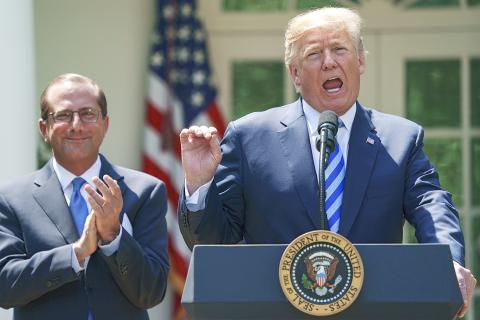US President Donald Trump on Friday blasted drugmakers and healthcare “middlemen” for making prescription drugs unaffordable for Americans, but healthcare stocks rose as experts said the administration avoided taking aggressive and direct measures to cut drug prices.
Trump said his administration would take aim at the “middlemen” in the drug industry who have become “very, very rich,” an apparent reference to health insurers and pharmacy benefit managers. He also said the pharmaceutical industry is making an “absolute fortune” at the expense of US taxpayers.
“Everyone involved in the broken system — the drugmakers, insurance companies, distributors, pharmacy benefit managers and many others — contribute to the problem,” Trump said.

Photo: AP
Shares of the major US companies in each of those sectors rose after the speech, with the S&P 500 healthcare sector, a broad gauge of large healthcare stocks, up 1.4 percent.
Trump also placed blame on foreign governments, which negotiate lower drug prices than in the US, saying they “extort” unreasonably low prices from US drugmakers.
Trump was speaking as his health deputies released a series of proposals to address high drug costs.
The US Department of Health and Human Services released what it called a blueprint titled “American Patients First” with details of its plan.
The administration’s immediate actions would include allowing commercial plans that administer Medicare Part D prescription drug benefits for seniors more power to negotiate prices with drugmakers, it said.
The US Food and Drug Administration would evaluate requiring drugmakers to include the list prices they set on medicines in their advertising.
Drugmakers argue that list prices do not reflect actual cost with discounts and rebates.
Some of the administration’s longer-term priorities include restricting use of rebates, creating incentives for drugmakers to lower list prices and investigating tools to address foreign government practices that it said could be harming innovation and driving up US prices.
Healthcare experts said Trump’s plan sounded like rhetoric rather than substantive change for an industry where prices rise substantially more than inflation each year.
“There’s not a big proposal here that is going to make a huge difference. There are a bunch of smaller technical changes,” Boston College associate professor of economics Sam Richardson said.
Regarding forcing other countries to pay more for drugs, Richardson said: “We don’t really have the policy levers to get that to happen.”
Secretary of Health and Human Services Alex Azar said during a White House briefing that many of the actions the government was considering would not require the US Congress, but could take place through executive action within months. He said it would take years to restructure the US drug system.
Healthcare stocks were volatile during Trump’s speech, with shares of companies involved in the pharmaceutical supply chain, such as Express Scripts Holding Co and CVS Health Corp, hitting session lows. However, those stocks quickly reversed course, with Express Scripts shares up 2.4 percent and CVS up 3 percent.

The US dollar was trading at NT$29.7 at 10am today on the Taipei Foreign Exchange, as the New Taiwan dollar gained NT$1.364 from the previous close last week. The NT dollar continued to rise today, after surging 3.07 percent on Friday. After opening at NT$30.91, the NT dollar gained more than NT$1 in just 15 minutes, briefly passing the NT$30 mark. Before the US Department of the Treasury's semi-annual currency report came out, expectations that the NT dollar would keep rising were already building. The NT dollar on Friday closed at NT$31.064, up by NT$0.953 — a 3.07 percent single-day gain. Today,

‘SHORT TERM’: The local currency would likely remain strong in the near term, driven by anticipated US trade pressure, capital inflows and expectations of a US Fed rate cut The US dollar is expected to fall below NT$30 in the near term, as traders anticipate increased pressure from Washington for Taiwan to allow the New Taiwan dollar to appreciate, Cathay United Bank (國泰世華銀行) chief economist Lin Chi-chao (林啟超) said. Following a sharp drop in the greenback against the NT dollar on Friday, Lin told the Central News Agency that the local currency is likely to remain strong in the short term, driven in part by market psychology surrounding anticipated US policy pressure. On Friday, the US dollar fell NT$0.953, or 3.07 percent, closing at NT$31.064 — its lowest level since Jan.

The New Taiwan dollar and Taiwanese stocks surged on signs that trade tensions between the world’s top two economies might start easing and as US tech earnings boosted the outlook of the nation’s semiconductor exports. The NT dollar strengthened as much as 3.8 percent versus the US dollar to 30.815, the biggest intraday gain since January 2011, closing at NT$31.064. The benchmark TAIEX jumped 2.73 percent to outperform the region’s equity gauges. Outlook for global trade improved after China said it is assessing possible trade talks with the US, providing a boost for the nation’s currency and shares. As the NT dollar

The Financial Supervisory Commission (FSC) yesterday met with some of the nation’s largest insurance companies as a skyrocketing New Taiwan dollar piles pressure on their hundreds of billions of dollars in US bond investments. The commission has asked some life insurance firms, among the biggest Asian holders of US debt, to discuss how the rapidly strengthening NT dollar has impacted their operations, people familiar with the matter said. The meeting took place as the NT dollar jumped as much as 5 percent yesterday, its biggest intraday gain in more than three decades. The local currency surged as exporters rushed to